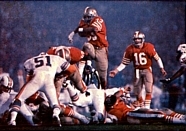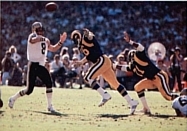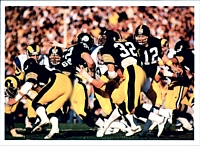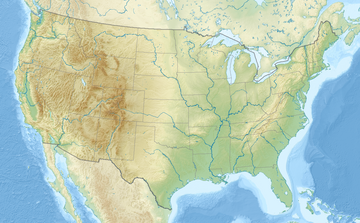The 2002 NFL season was the 83rd regular season of the National Football League (NFL).
The 2003 NFL season was the 84th regular season of the National Football League (NFL).
The 1997 NFL season was the 78th regular season of the National Football League (NFL). The Oilers relocated from Houston, Texas to Nashville, Tennessee. The newly renamed Tennessee Oilers played their home games during this season at the Liberty Bowl Memorial Stadium in Memphis, Tennessee while construction of a new stadium in Nashville started. Houston would rejoin the NFL with the expansion Texans in 2002.
The 1998 NFL season was the 79th regular season of the National Football League (NFL). The season culminated with Super Bowl XXXIII, with the Denver Broncos defeating the Atlanta Falcons 34–19 at Pro Player Stadium in Miami. The Broncos had won their first thirteen games, the best start since the undefeated 1972 Dolphins, and were tipped by some to have a realistic chance at winning all nineteen games. The Minnesota Vikings became the first team since the 1968 Baltimore Colts to win all but one of their regular season games and not win the Super Bowl. After no team had won 14 regular season games since the 1992 49ers, three teams went 14–2 or better for the only time in a 16-game season.
The 1996 NFL season was the 77th regular season of the National Football League (NFL) and the season was marked by notable controversies from beginning to end. Most significantly, the Cleveland Browns relocation controversy resulted in a then-unique legal settlement where the Cleveland Browns franchise, history, records, and intellectual property remained in Cleveland, while its players and personnel transferred to Baltimore, technically to a new league franchise that was named the Baltimore Ravens.
The 1995 NFL season was the 76th regular season of the National Football League (NFL). The league expanded to 30 teams with the addition of the Carolina Panthers and the Jacksonville Jaguars. The two expansion teams were slotted into the two remaining divisions that previously had only four teams : the AFC Central (Jaguars) and the NFC West (Panthers).
The 1992 NFL season was the 73rd regular season of the National Football League (NFL). Due to the damage caused by Hurricane Andrew, the New England Patriots at Miami Dolphins game that was scheduled for September 6 at Joe Robbie Stadium was rescheduled to October 18. Both teams originally had that weekend off. This marked the first time since the 1966 NFL season and the AFL seasons of 1966 and 1967 that there were byes in week 1.

The 1987 NFL season was the 68th regular season of the National Football League (NFL). This season featured games predominantly played by replacement players, as the National Football League Players Association (NFLPA) players were on strike from weeks four to six with week three being cancelled in its entirety. This remains the last NFL season in which regular-season games were impacted by a labor conflict.
The 1986 NFL season was the 67th regular season of the National Football League. Defending Super Bowl Champion Chicago Bears shared the league's best record with the Giants at 14–2, with the Giants claiming the spot in the NFC by tiebreakers. In the AFC, the Cleveland Browns earned home-field advantage with a record of 12–4, and they hosted the New York Jets in round one of the AFC playoffs. The Jets had started the season at 10–1 before losing their final five contests. The game went to double OT, with the Browns finally prevailing 23–20. The following Sunday, John Elway and the Denver Broncos defeated the Browns by an identical score in a game known for The Drive, where Elway drove his team 98 yards to send the game to overtime to win. The Giants would defeat their rival Washington Redskins in the NFC title game, blanking them 17–0 to advance to their first Super Bowl. The season ended with Super Bowl XXI when the New York Giants defeated the Denver Broncos 39–20 at the Rose Bowl to win their first league title in 30 years.

The 1984 NFL season was the 65th regular season of the National Football League. The Colts relocated from Baltimore, Maryland, to Indianapolis, Indiana, before the season.
The 1983 NFL season was the 64th regular season of the National Football League. The Colts played their final season in Baltimore before the team's relocation to Indianapolis the following season. The season ended with Super Bowl XVIII when the Los Angeles Raiders defeated the Washington Redskins 38–9 at Tampa Stadium in Florida.

The 1981 NFL season was the 62nd regular season of the National Football League. The season ended with Super Bowl XVI when the San Francisco 49ers defeated the Cincinnati Bengals 26–21 at the Pontiac Silverdome in Michigan.

The 1980 NFL season was the 61st regular season of the National Football League.

The 1979 NFL season was the 60th regular season of the National Football League. The season ended with Super Bowl XIV when the Pittsburgh Steelers repeated as champions by defeating the Los Angeles Rams 31–19 at the Rose Bowl. The Steelers became the first team to win back-to-back Super Bowls twice.

The 1978 NFL season was the 59th regular season of the National Football League. The league expanded the regular season from a 14-game schedule to 16 games, which it remained in place until 2021 when it was increased to 17 games. Furthermore, the playoff format was expanded from 8 teams to 10 teams by adding another wild card from each conference. The wild card teams played each other, with the winner advancing to the playoff round of eight teams.
The 1976 NFL season was the 57th regular season of the National Football League. The league expanded to 28 teams with the addition of Seattle Seahawks and Tampa Bay Buccaneers. This fulfilled one of the conditions agreed to in 1966 for the 1970 AFL–NFL merger, which called for the league to expand to 28 teams by 1970 or soon thereafter.
The 1975 NFL season was the 56th regular season of the National Football League.
The 1974 NFL season was the 55th regular season of the National Football League. The season ended with Super Bowl IX when the Pittsburgh Steelers defeated the Minnesota Vikings. Players held a strike from July 1 until August 10, prior to the regular season beginning; only one preseason game was canceled, and the preseason contests were held with all-rookie rosters.

The 1973 NFL season was the 54th regular season of the National Football League. The season was highlighted by O. J. Simpson becoming the first player to rush for 2,000 yards in one season.
The 1970 NFL season was the 51st regular season of the National Football League, and the first after the consummation of the AFL–NFL merger. The merged league realigned into two conferences: all ten of the American Football League (AFL) teams joined the Baltimore Colts, Cleveland Browns, and Pittsburgh Steelers to form the American Football Conference (AFC); the other thirteen NFL clubs formed the National Football Conference (NFC).







